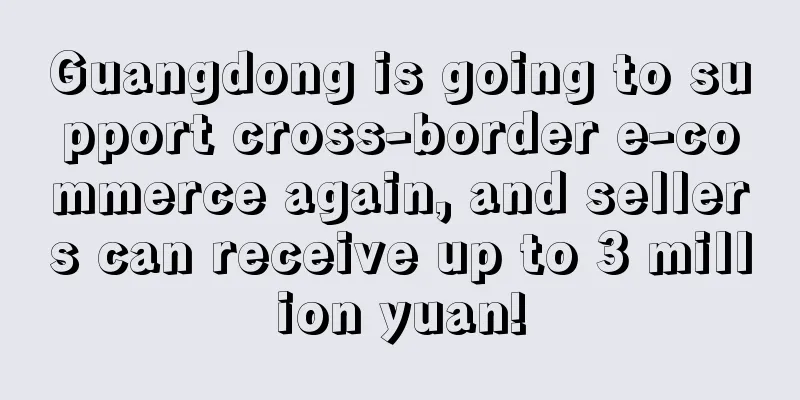Guangdong is going to support cross-border e-commerce again, and sellers can receive up to 3 million yuan!

|
Cross-border e-commerce has become a new driving force for the development of Guangdong's foreign trade, and Guangdong has attached increasing importance to the development of cross-border e-commerce. Whether in terms of policy or finance, it provides all-round support and guarantees , allowing the cross-border e-commerce industry to develop in a safer and more comfortable environment.
All-round policy support to ensure rapid development of enterprises
Recently, in order to promote the leapfrog development of the cross-border e-commerce industry, the General Office of the People's Government of Guangdong Province issued a notice on "Several Policy Measures to Promote the High-Quality Development of Cross-border E-commerce".
What is worthy of sellers' attention is that this measure provides support to eligible cross-border e-commerce companies in terms of corporate land, senior executives' settlement, children's schooling, etc., and provides financial policy support to companies that build their own independent stations and reach a certain scale.
Relevant policy measures also proposed to carry out the "industrial cluster + cross-border e-commerce " pilot project, support enterprises in building digital collaborative vouchers for cross-border e-commerce supply chains, and help traditional enterprises "go overseas."
By 2025 , we will strive to build 20 " industry cluster + cross-border e-commerce " pilot projects, cultivate 100 cross-border e-commerce sellers with annual transaction volume of more than 100 million yuan, and cultivate 100 cross-border e-commerce independent brands with annual sales of more than 100 million yuan.
The Measures also emphasize the need to improve the efficiency of warehousing and logistics, encourage enterprises to build international distribution networks, and improve distribution and delivery efficiency. Support the construction of overseas warehouses for cross-border e-commerce, and strive to build 500 overseas warehouses by 2025, gradually forming a professional and intelligent overseas warehouse network.
Use policy support to focus on cross-border e-commerce companies and ensure that they achieve high-quality development.
Up to 3 million yuan of financial support is available , and cross-border e-commerce policies are upgraded again
In Huangpu District, the "Several Measures on Further Promoting the Development of Cross-border E-commerce Industry in Guangzhou Development Zone , Huangpu District, Guangzhou" was recently issued to further upgrade the e-commerce support policy and provide real support to the cross-border e-commerce industry.
Among them, the editor has sorted out several points that sellers are more concerned about:
1. Support the development of cross-border e-commerce entities. Encourage cross-border e-commerce to innovate business models, and provide 3 million yuan of settlement support to newly established and qualified cross-border e-commerce enterprises. Provide 3 million yuan of settlement support to qualified cross-border e-commerce enterprises outside the city that move to our district ; encourage cross-border e-commerce to develop in a personalized, professional and large-scale manner, and provide 600,000 yuan, 1.2 million yuan and 2.4 million yuan of support to qualified cross-border e-commerce enterprises respectively .
2. Support the development of cross-border e-commerce carriers. Qualified cross-border e-commerce regulatory centers will be given financial support of RMB 2 million, RMB 1 million, and RMB 500,000 respectively ; cross-border e-commerce enterprises are encouraged to gather and develop, and qualified enterprises can receive up to RMB 500,000 in financial support each year.
3. Support the construction and operation of cross-border e-commerce global central warehouses and international distribution networks. Support cross-border e-commerce companies to carry out international logistics distribution business, and provide a one-time support of 3 million yuan to qualified companies; support the construction of overseas warehouses, and provide a one-time support of 200,000 yuan for each approved project for qualified companies , with a maximum of 1 million yuan per company per year .
4. Encourage the cultivation of cross-border e-commerce talents; support the overall utilization of cross-border e-commerce data, and provide 500,000 yuan of financial support each year to enterprises that are recognized as providing data support services .
In recent years, many cross-border sellers have moved their businesses back to their hometowns from Guangzhou and Shenzhen. However, most sellers said that they feel happier when they start their own business back home, but unfortunately the logistics and entrepreneurial environments in Guangzhou and Shenzhen are still more attractive.
Therefore, compared with Guangzhou’s first cross-border e-commerce support policy ( version 1.0 ) issued in 2018 , the upgraded policy not only provides greater support and a wider scope of support, but also focuses on the construction of the cross-border e-commerce industry ecosystem, creating a comfortable office environment for cross-border people .
With an import and export volume of more than 170 billion yuan, Guangdong firmly sits at the top of cross-border e-commerce
Speaking of Guangdong, it is a clear leader in cross-border e-commerce. Data shows that from 2016 to 2020, the import and export volume of cross-border e-commerce in Guangdong increased from 22.796 billion yuan to 172.646 billion yuan, with an average annual growth rate of 65.9%, ranking first in the country for seven consecutive years.
Firstly, Guangdong itself has a complete range of industries, and its electronic information, electrical machinery, petrochemical, textile and clothing, food and beverage, and building materials industries have obvious advantages in the country.
Since the country launched the cross-border e-commerce pilot city in 2013, Guangzhou has taken the lead in piloting the cross-border e-commerce management filing system based on its traditional foreign trade resources. Shenzhen also obtained the import and export two-way pilot qualification in 2014 and issued the country's first local standard for cross-border e-commerce.
According to the Forward-looking Industry Research Institute, as of May 2020, there are a total of 105 cross-border e-commerce comprehensive pilot zones in China, of which Guangdong accounts for 13, the largest number in the country.
These pilot areas are mainly concentrated in coastal areas, including Guangzhou, Shenzhen, Dongguan, Zhuhai, Foshan, Shantou, Zhongshan, Jiangmen, Maoming, Zhanjiang, Zhaoqing and Meizhou.
According to data from the Guangdong Provincial Department of Commerce, as of the end of 2019, the six cross-border e-commerce comprehensive pilot zones of Guangzhou, Shenzhen, Zhuhai, Dongguan, Foshan and Shantou had built 3,918 registered companies on online comprehensive service platforms, 25 offline cross-border e-commerce industrial parks, and completed 68 institutional innovations.
The effect of the comprehensive pilot zone is quite obvious. In 2019, the import and export volume of these six cross-border e-commerce comprehensive pilot zones reached 107.96 billion yuan, accounting for 97.4% of the province's total during the same period.
The "China E-Commerce Development Index Report" shows that Guangdong Province's e-commerce development index was 65.6 in 2018, surpassing Zhejiang (52.62) and Beijing (45.84), ranking first, and it has won this title for the fourth consecutive year.
This index has many criteria, and is based on multiple dimensions such as e-commerce infrastructure, logistics environment, and human capital environment. Guangdong ranks first, which can be said to be using data to show that Guangdong has a good e-commerce foundation.
To reach a higher level, more efforts are needed
Although the development trend of cross-border e-commerce in Guangdong is good, it is still an emerging industry after all and has encountered many problems in the process of development.
For example, there is a shortage of talent. Deng Shunguo, director of the Teaching Steering Committee for E-commerce Majors in Guangdong Province's Undergraduate Colleges, said that in 2019, Guangdong established a cross-border e-commerce major for the first time, and this year it will approve another four colleges to establish cross-border e-commerce majors, which will produce about 1,000 graduates each year. However, he emphasized that compared with the hundreds of thousands of cross-border e-commerce companies in Guangdong, there are still more people than porridge.
In addition, cross-border e-commerce products are highly homogenized. The low-threshold cross-border e-commerce self-operated procurement model is mostly homogenized competition, triggering price wars.
There is also the issue of credit, such as the sale of counterfeit and shoddy products. The editor learned that in many rights protection lawsuits, companies in Guangzhou, Shenzhen and other places often appear on the defendant list.
Another reason is that the products are substandard. Data shows that in the first three quarters of this year, the U.S. Consumer Product Safety Commission ( CPSC) issued a total of 173 recall notices. Among them, 106 products came from China , an increase of 17.8% year-on-year, accounting for 61.3% of the total CPSC recalls , an increase of 14.2 percentage points over the same period last year , involving an amount of approximately US$5.18 billion.
Of course, since cross-border e-commerce is mainly a B2C model, its logistics and transportation are somewhat different from the traditional logistics model. However, in recent years, customs in many places in Guangdong have successively opened cross-border export channels.
Moreover, the latest "Notice" issued by Guangdong Province is also aimed at improving the above problems. Huangpu District has taken the lead and set an example by subsidizing 3 million yuan.
In addition to Guangzhou, Shenzhen also issued an announcement in August this year to encourage enterprises to conduct cross-border e-commerce through independent websites, and to provide 2 million yuan in funding for each project. One of the conditions is that the average monthly sales of the independent website in the past year is more than 300,000 US dollars (including 300,000 US dollars).
In response to this, a seller commented: Those who have this much sales volume are definitely not short of money, and those who are short of money have no chance of getting it, so is there any future for small sellers?
Indeed, many subsidies have certain thresholds, and small vendors may not be able to enjoy this direct benefit immediately, but with the upgrading and improvement of various links (such as logistics, customs clearance, etc.), the entire business environment in Guangdong will become better and better. Indirectly, sellers still benefit.
Guangdong Cross-border e-commerce Support policies |
<<: "Amazon Global Store Cross-border Summit" will be held online in January 2022
Recommend
The sales of the independent station soared by 23%, and it said that it would continue to raise prices.
According to foreign media reports, Allbirds'...
What is aikchinhin? aikchinhin Review, Features
Aikchinhin is a converted hardware store. About Ai...
What is Urban Outfitters? Urban Outfitters Review, Features
Urban Outfitters began as a small store with a vi...
A wave of account registrations has broken out, and middle school students and village uncles are also joining Amazon...
Outsider: So excited! Amazon, I’m here to make mo...
Zhejiang sellers sell 200 million yuan in one and a half years by creating high-quality products and brands
Chinese brands are emerging in the global market....
What is outofstock? outofstock Review, Features
Founded in Hong Kong in 2007, outofstock creates h...
What is buyqi? buyqi Review, Features
buyqi can provide companies with accurate, detaile...
What is INTTRA? INTTRA Review, Features
INTTRA is the largest neutral network, software a...
Alibaba International Station's foreign trade companies have achieved new speed in exports to RCEP member countries
Foreign trade companies on the Alibaba Internatio...
110,000 pieces sold in two days! Another big hit overseas
In recent years, more and more domestically produ...
It received 140 million in financing within one year of its establishment. This channel is too crazy!
Independent stations have reached their highlight...
What is Tumblingjazz? Tumblingjazz Review, Features
Tumblingjazz is a very powerful social blog admin...
What is Framebridge? Framebridge Review, Features
Founded in 2014, Framebridge is a custom framing ...
What is ClickBank? ClickBank Review, Features
ClickBank was founded in 1998 and is one of the f...
Another Amazon seller leaves the office after giving up the lease!
Some sellers are selling out their office space o...









